SC003 Essay: Examining the Needs of Young Carers of Dementia Patients
VerifiedAdded on 2023/06/11
|7
|3021
|314
Essay
AI Summary
This essay explores the needs of young adult informal carers who provide unpaid care to individuals suffering from dementia in the UK. It highlights the challenges these carers face, including impacts on education, employment, and mental health. The essay references relevant legislation such as the Carers (Recognition and Services) Act 1995 and the Work and Families Act 2006, discussing the rights and support services available to carers. It also addresses the impact of caring responsibilities on carers' careers and financial stability, emphasizing the importance of providing adequate support and respite to prevent mental health problems and social isolation. The essay concludes by advocating for increased awareness and comprehensive support systems tailored to the unique needs of young adult carers of dementia patients.

Informal Carers
Essay
Essay
Paraphrase This Document
Need a fresh take? Get an instant paraphrase of this document with our AI Paraphraser
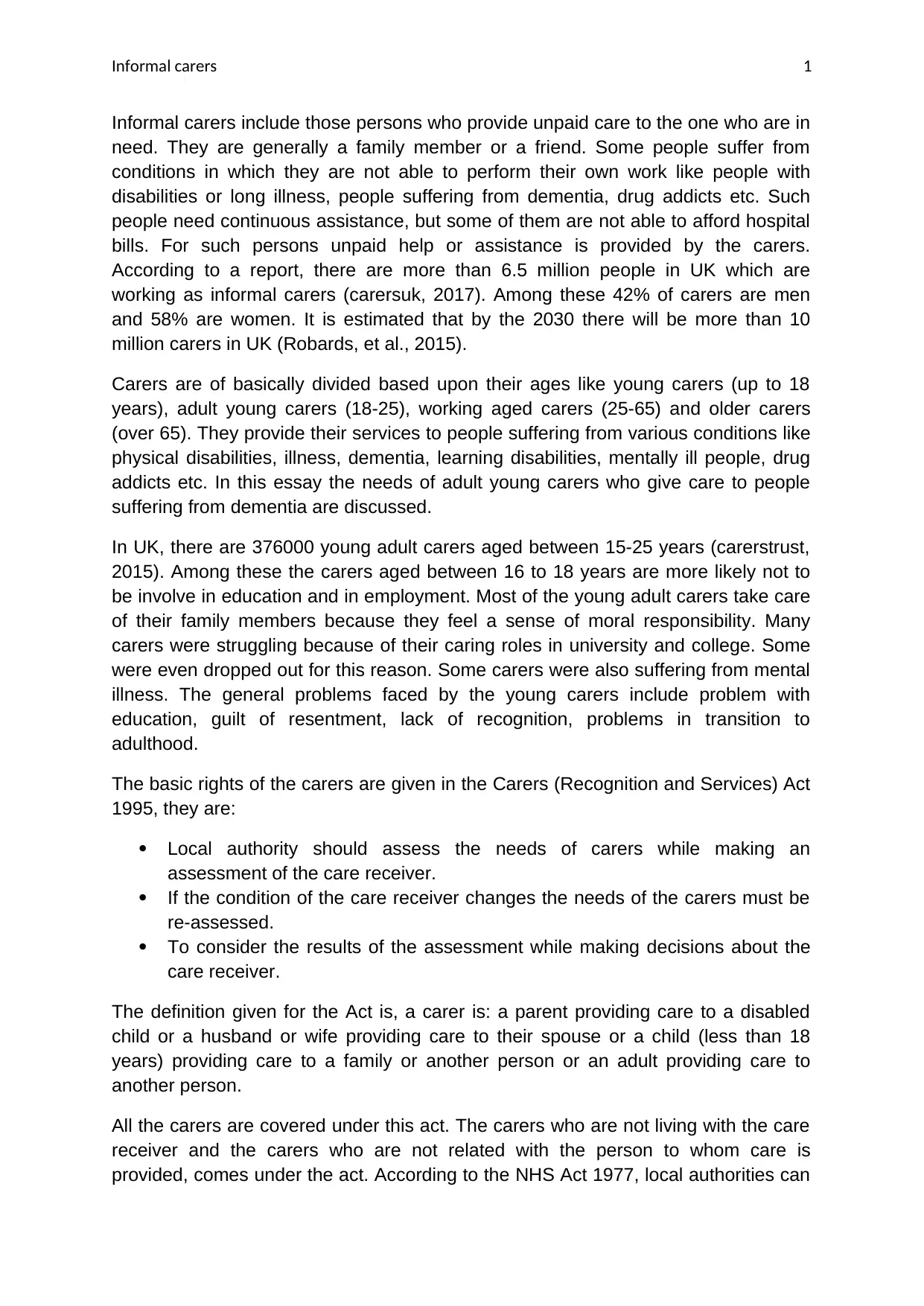
Informal carers 1
Informal carers include those persons who provide unpaid care to the one who are in
need. They are generally a family member or a friend. Some people suffer from
conditions in which they are not able to perform their own work like people with
disabilities or long illness, people suffering from dementia, drug addicts etc. Such
people need continuous assistance, but some of them are not able to afford hospital
bills. For such persons unpaid help or assistance is provided by the carers.
According to a report, there are more than 6.5 million people in UK which are
working as informal carers (carersuk, 2017). Among these 42% of carers are men
and 58% are women. It is estimated that by the 2030 there will be more than 10
million carers in UK (Robards, et al., 2015).
Carers are of basically divided based upon their ages like young carers (up to 18
years), adult young carers (18-25), working aged carers (25-65) and older carers
(over 65). They provide their services to people suffering from various conditions like
physical disabilities, illness, dementia, learning disabilities, mentally ill people, drug
addicts etc. In this essay the needs of adult young carers who give care to people
suffering from dementia are discussed.
In UK, there are 376000 young adult carers aged between 15-25 years (carerstrust,
2015). Among these the carers aged between 16 to 18 years are more likely not to
be involve in education and in employment. Most of the young adult carers take care
of their family members because they feel a sense of moral responsibility. Many
carers were struggling because of their caring roles in university and college. Some
were even dropped out for this reason. Some carers were also suffering from mental
illness. The general problems faced by the young carers include problem with
education, guilt of resentment, lack of recognition, problems in transition to
adulthood.
The basic rights of the carers are given in the Carers (Recognition and Services) Act
1995, they are:
Local authority should assess the needs of carers while making an
assessment of the care receiver.
If the condition of the care receiver changes the needs of the carers must be
re-assessed.
To consider the results of the assessment while making decisions about the
care receiver.
The definition given for the Act is, a carer is: a parent providing care to a disabled
child or a husband or wife providing care to their spouse or a child (less than 18
years) providing care to a family or another person or an adult providing care to
another person.
All the carers are covered under this act. The carers who are not living with the care
receiver and the carers who are not related with the person to whom care is
provided, comes under the act. According to the NHS Act 1977, local authorities can
Informal carers include those persons who provide unpaid care to the one who are in
need. They are generally a family member or a friend. Some people suffer from
conditions in which they are not able to perform their own work like people with
disabilities or long illness, people suffering from dementia, drug addicts etc. Such
people need continuous assistance, but some of them are not able to afford hospital
bills. For such persons unpaid help or assistance is provided by the carers.
According to a report, there are more than 6.5 million people in UK which are
working as informal carers (carersuk, 2017). Among these 42% of carers are men
and 58% are women. It is estimated that by the 2030 there will be more than 10
million carers in UK (Robards, et al., 2015).
Carers are of basically divided based upon their ages like young carers (up to 18
years), adult young carers (18-25), working aged carers (25-65) and older carers
(over 65). They provide their services to people suffering from various conditions like
physical disabilities, illness, dementia, learning disabilities, mentally ill people, drug
addicts etc. In this essay the needs of adult young carers who give care to people
suffering from dementia are discussed.
In UK, there are 376000 young adult carers aged between 15-25 years (carerstrust,
2015). Among these the carers aged between 16 to 18 years are more likely not to
be involve in education and in employment. Most of the young adult carers take care
of their family members because they feel a sense of moral responsibility. Many
carers were struggling because of their caring roles in university and college. Some
were even dropped out for this reason. Some carers were also suffering from mental
illness. The general problems faced by the young carers include problem with
education, guilt of resentment, lack of recognition, problems in transition to
adulthood.
The basic rights of the carers are given in the Carers (Recognition and Services) Act
1995, they are:
Local authority should assess the needs of carers while making an
assessment of the care receiver.
If the condition of the care receiver changes the needs of the carers must be
re-assessed.
To consider the results of the assessment while making decisions about the
care receiver.
The definition given for the Act is, a carer is: a parent providing care to a disabled
child or a husband or wife providing care to their spouse or a child (less than 18
years) providing care to a family or another person or an adult providing care to
another person.
All the carers are covered under this act. The carers who are not living with the care
receiver and the carers who are not related with the person to whom care is
provided, comes under the act. According to the NHS Act 1977, local authorities can
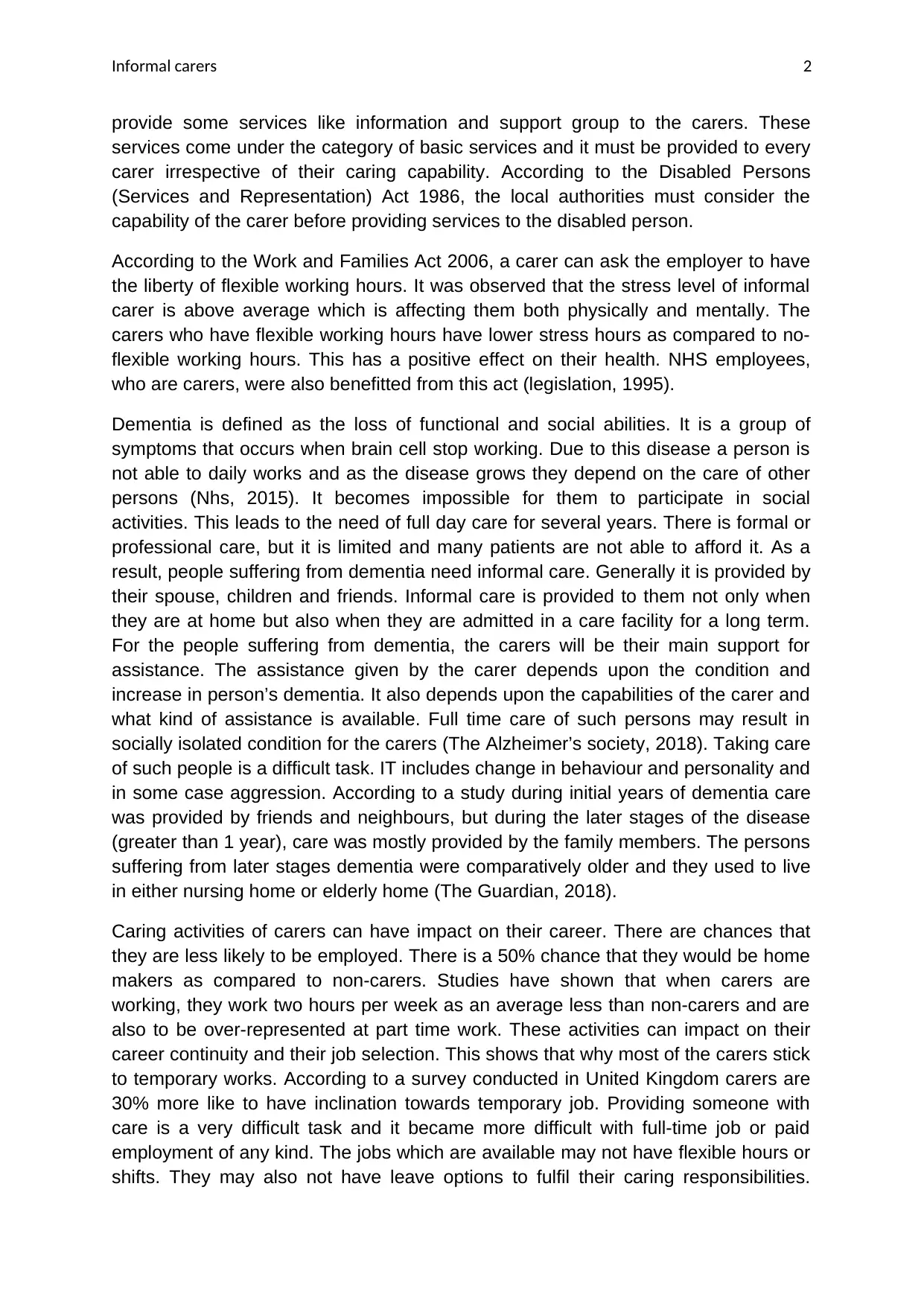
Informal carers 2
provide some services like information and support group to the carers. These
services come under the category of basic services and it must be provided to every
carer irrespective of their caring capability. According to the Disabled Persons
(Services and Representation) Act 1986, the local authorities must consider the
capability of the carer before providing services to the disabled person.
According to the Work and Families Act 2006, a carer can ask the employer to have
the liberty of flexible working hours. It was observed that the stress level of informal
carer is above average which is affecting them both physically and mentally. The
carers who have flexible working hours have lower stress hours as compared to no-
flexible working hours. This has a positive effect on their health. NHS employees,
who are carers, were also benefitted from this act (legislation, 1995).
Dementia is defined as the loss of functional and social abilities. It is a group of
symptoms that occurs when brain cell stop working. Due to this disease a person is
not able to daily works and as the disease grows they depend on the care of other
persons (Nhs, 2015). It becomes impossible for them to participate in social
activities. This leads to the need of full day care for several years. There is formal or
professional care, but it is limited and many patients are not able to afford it. As a
result, people suffering from dementia need informal care. Generally it is provided by
their spouse, children and friends. Informal care is provided to them not only when
they are at home but also when they are admitted in a care facility for a long term.
For the people suffering from dementia, the carers will be their main support for
assistance. The assistance given by the carer depends upon the condition and
increase in person’s dementia. It also depends upon the capabilities of the carer and
what kind of assistance is available. Full time care of such persons may result in
socially isolated condition for the carers (The Alzheimer’s society, 2018). Taking care
of such people is a difficult task. IT includes change in behaviour and personality and
in some case aggression. According to a study during initial years of dementia care
was provided by friends and neighbours, but during the later stages of the disease
(greater than 1 year), care was mostly provided by the family members. The persons
suffering from later stages dementia were comparatively older and they used to live
in either nursing home or elderly home (The Guardian, 2018).
Caring activities of carers can have impact on their career. There are chances that
they are less likely to be employed. There is a 50% chance that they would be home
makers as compared to non-carers. Studies have shown that when carers are
working, they work two hours per week as an average less than non-carers and are
also to be over-represented at part time work. These activities can impact on their
career continuity and their job selection. This shows that why most of the carers stick
to temporary works. According to a survey conducted in United Kingdom carers are
30% more like to have inclination towards temporary job. Providing someone with
care is a very difficult task and it became more difficult with full-time job or paid
employment of any kind. The jobs which are available may not have flexible hours or
shifts. They may also not have leave options to fulfil their caring responsibilities.
provide some services like information and support group to the carers. These
services come under the category of basic services and it must be provided to every
carer irrespective of their caring capability. According to the Disabled Persons
(Services and Representation) Act 1986, the local authorities must consider the
capability of the carer before providing services to the disabled person.
According to the Work and Families Act 2006, a carer can ask the employer to have
the liberty of flexible working hours. It was observed that the stress level of informal
carer is above average which is affecting them both physically and mentally. The
carers who have flexible working hours have lower stress hours as compared to no-
flexible working hours. This has a positive effect on their health. NHS employees,
who are carers, were also benefitted from this act (legislation, 1995).
Dementia is defined as the loss of functional and social abilities. It is a group of
symptoms that occurs when brain cell stop working. Due to this disease a person is
not able to daily works and as the disease grows they depend on the care of other
persons (Nhs, 2015). It becomes impossible for them to participate in social
activities. This leads to the need of full day care for several years. There is formal or
professional care, but it is limited and many patients are not able to afford it. As a
result, people suffering from dementia need informal care. Generally it is provided by
their spouse, children and friends. Informal care is provided to them not only when
they are at home but also when they are admitted in a care facility for a long term.
For the people suffering from dementia, the carers will be their main support for
assistance. The assistance given by the carer depends upon the condition and
increase in person’s dementia. It also depends upon the capabilities of the carer and
what kind of assistance is available. Full time care of such persons may result in
socially isolated condition for the carers (The Alzheimer’s society, 2018). Taking care
of such people is a difficult task. IT includes change in behaviour and personality and
in some case aggression. According to a study during initial years of dementia care
was provided by friends and neighbours, but during the later stages of the disease
(greater than 1 year), care was mostly provided by the family members. The persons
suffering from later stages dementia were comparatively older and they used to live
in either nursing home or elderly home (The Guardian, 2018).
Caring activities of carers can have impact on their career. There are chances that
they are less likely to be employed. There is a 50% chance that they would be home
makers as compared to non-carers. Studies have shown that when carers are
working, they work two hours per week as an average less than non-carers and are
also to be over-represented at part time work. These activities can impact on their
career continuity and their job selection. This shows that why most of the carers stick
to temporary works. According to a survey conducted in United Kingdom carers are
30% more like to have inclination towards temporary job. Providing someone with
care is a very difficult task and it became more difficult with full-time job or paid
employment of any kind. The jobs which are available may not have flexible hours or
shifts. They may also not have leave options to fulfil their caring responsibilities.
⊘ This is a preview!⊘
Do you want full access?
Subscribe today to unlock all pages.

Trusted by 1+ million students worldwide
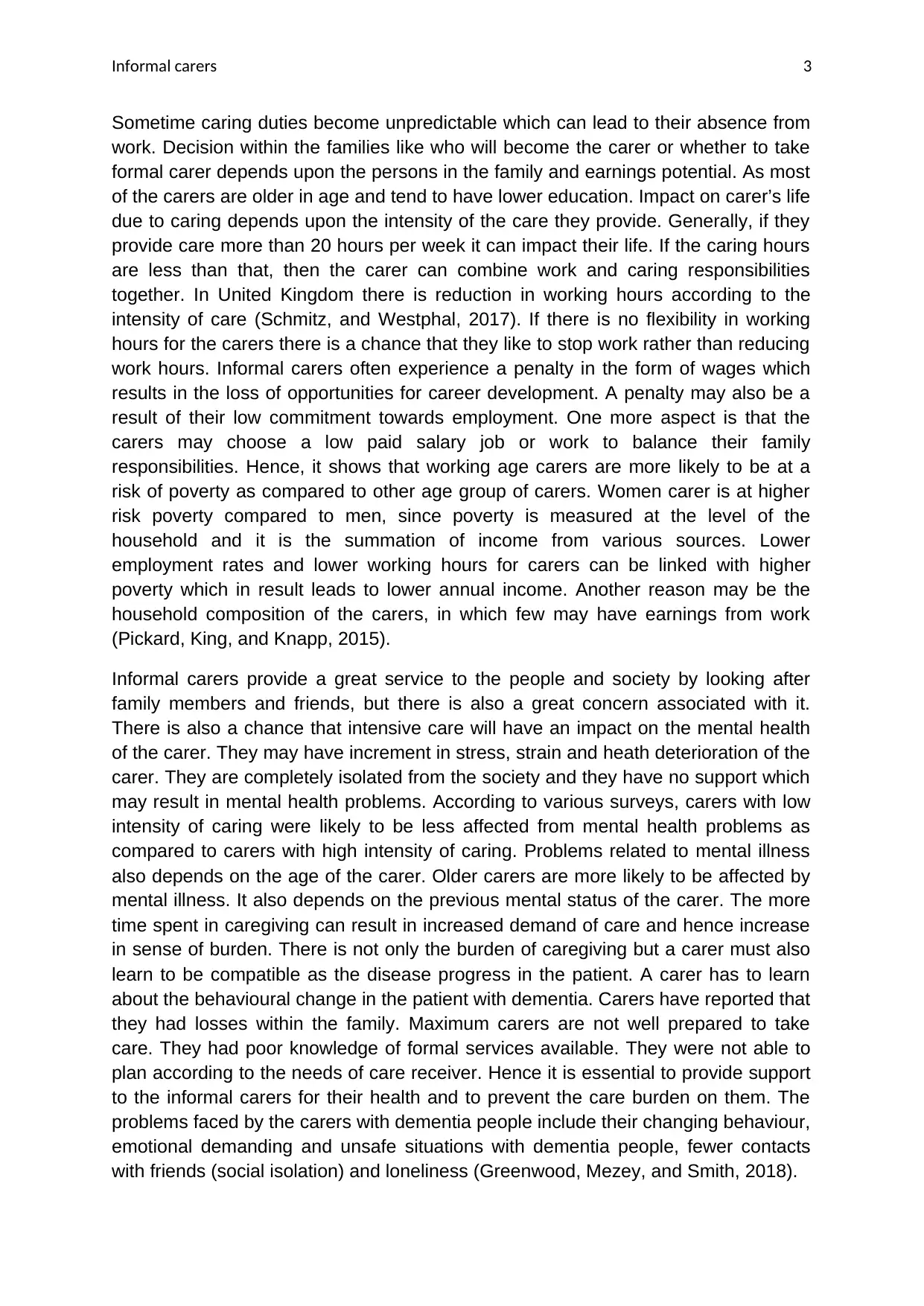
Informal carers 3
Sometime caring duties become unpredictable which can lead to their absence from
work. Decision within the families like who will become the carer or whether to take
formal carer depends upon the persons in the family and earnings potential. As most
of the carers are older in age and tend to have lower education. Impact on carer’s life
due to caring depends upon the intensity of the care they provide. Generally, if they
provide care more than 20 hours per week it can impact their life. If the caring hours
are less than that, then the carer can combine work and caring responsibilities
together. In United Kingdom there is reduction in working hours according to the
intensity of care (Schmitz, and Westphal, 2017). If there is no flexibility in working
hours for the carers there is a chance that they like to stop work rather than reducing
work hours. Informal carers often experience a penalty in the form of wages which
results in the loss of opportunities for career development. A penalty may also be a
result of their low commitment towards employment. One more aspect is that the
carers may choose a low paid salary job or work to balance their family
responsibilities. Hence, it shows that working age carers are more likely to be at a
risk of poverty as compared to other age group of carers. Women carer is at higher
risk poverty compared to men, since poverty is measured at the level of the
household and it is the summation of income from various sources. Lower
employment rates and lower working hours for carers can be linked with higher
poverty which in result leads to lower annual income. Another reason may be the
household composition of the carers, in which few may have earnings from work
(Pickard, King, and Knapp, 2015).
Informal carers provide a great service to the people and society by looking after
family members and friends, but there is also a great concern associated with it.
There is also a chance that intensive care will have an impact on the mental health
of the carer. They may have increment in stress, strain and heath deterioration of the
carer. They are completely isolated from the society and they have no support which
may result in mental health problems. According to various surveys, carers with low
intensity of caring were likely to be less affected from mental health problems as
compared to carers with high intensity of caring. Problems related to mental illness
also depends on the age of the carer. Older carers are more likely to be affected by
mental illness. It also depends on the previous mental status of the carer. The more
time spent in caregiving can result in increased demand of care and hence increase
in sense of burden. There is not only the burden of caregiving but a carer must also
learn to be compatible as the disease progress in the patient. A carer has to learn
about the behavioural change in the patient with dementia. Carers have reported that
they had losses within the family. Maximum carers are not well prepared to take
care. They had poor knowledge of formal services available. They were not able to
plan according to the needs of care receiver. Hence it is essential to provide support
to the informal carers for their health and to prevent the care burden on them. The
problems faced by the carers with dementia people include their changing behaviour,
emotional demanding and unsafe situations with dementia people, fewer contacts
with friends (social isolation) and loneliness (Greenwood, Mezey, and Smith, 2018).
Sometime caring duties become unpredictable which can lead to their absence from
work. Decision within the families like who will become the carer or whether to take
formal carer depends upon the persons in the family and earnings potential. As most
of the carers are older in age and tend to have lower education. Impact on carer’s life
due to caring depends upon the intensity of the care they provide. Generally, if they
provide care more than 20 hours per week it can impact their life. If the caring hours
are less than that, then the carer can combine work and caring responsibilities
together. In United Kingdom there is reduction in working hours according to the
intensity of care (Schmitz, and Westphal, 2017). If there is no flexibility in working
hours for the carers there is a chance that they like to stop work rather than reducing
work hours. Informal carers often experience a penalty in the form of wages which
results in the loss of opportunities for career development. A penalty may also be a
result of their low commitment towards employment. One more aspect is that the
carers may choose a low paid salary job or work to balance their family
responsibilities. Hence, it shows that working age carers are more likely to be at a
risk of poverty as compared to other age group of carers. Women carer is at higher
risk poverty compared to men, since poverty is measured at the level of the
household and it is the summation of income from various sources. Lower
employment rates and lower working hours for carers can be linked with higher
poverty which in result leads to lower annual income. Another reason may be the
household composition of the carers, in which few may have earnings from work
(Pickard, King, and Knapp, 2015).
Informal carers provide a great service to the people and society by looking after
family members and friends, but there is also a great concern associated with it.
There is also a chance that intensive care will have an impact on the mental health
of the carer. They may have increment in stress, strain and heath deterioration of the
carer. They are completely isolated from the society and they have no support which
may result in mental health problems. According to various surveys, carers with low
intensity of caring were likely to be less affected from mental health problems as
compared to carers with high intensity of caring. Problems related to mental illness
also depends on the age of the carer. Older carers are more likely to be affected by
mental illness. It also depends on the previous mental status of the carer. The more
time spent in caregiving can result in increased demand of care and hence increase
in sense of burden. There is not only the burden of caregiving but a carer must also
learn to be compatible as the disease progress in the patient. A carer has to learn
about the behavioural change in the patient with dementia. Carers have reported that
they had losses within the family. Maximum carers are not well prepared to take
care. They had poor knowledge of formal services available. They were not able to
plan according to the needs of care receiver. Hence it is essential to provide support
to the informal carers for their health and to prevent the care burden on them. The
problems faced by the carers with dementia people include their changing behaviour,
emotional demanding and unsafe situations with dementia people, fewer contacts
with friends (social isolation) and loneliness (Greenwood, Mezey, and Smith, 2018).
Paraphrase This Document
Need a fresh take? Get an instant paraphrase of this document with our AI Paraphraser
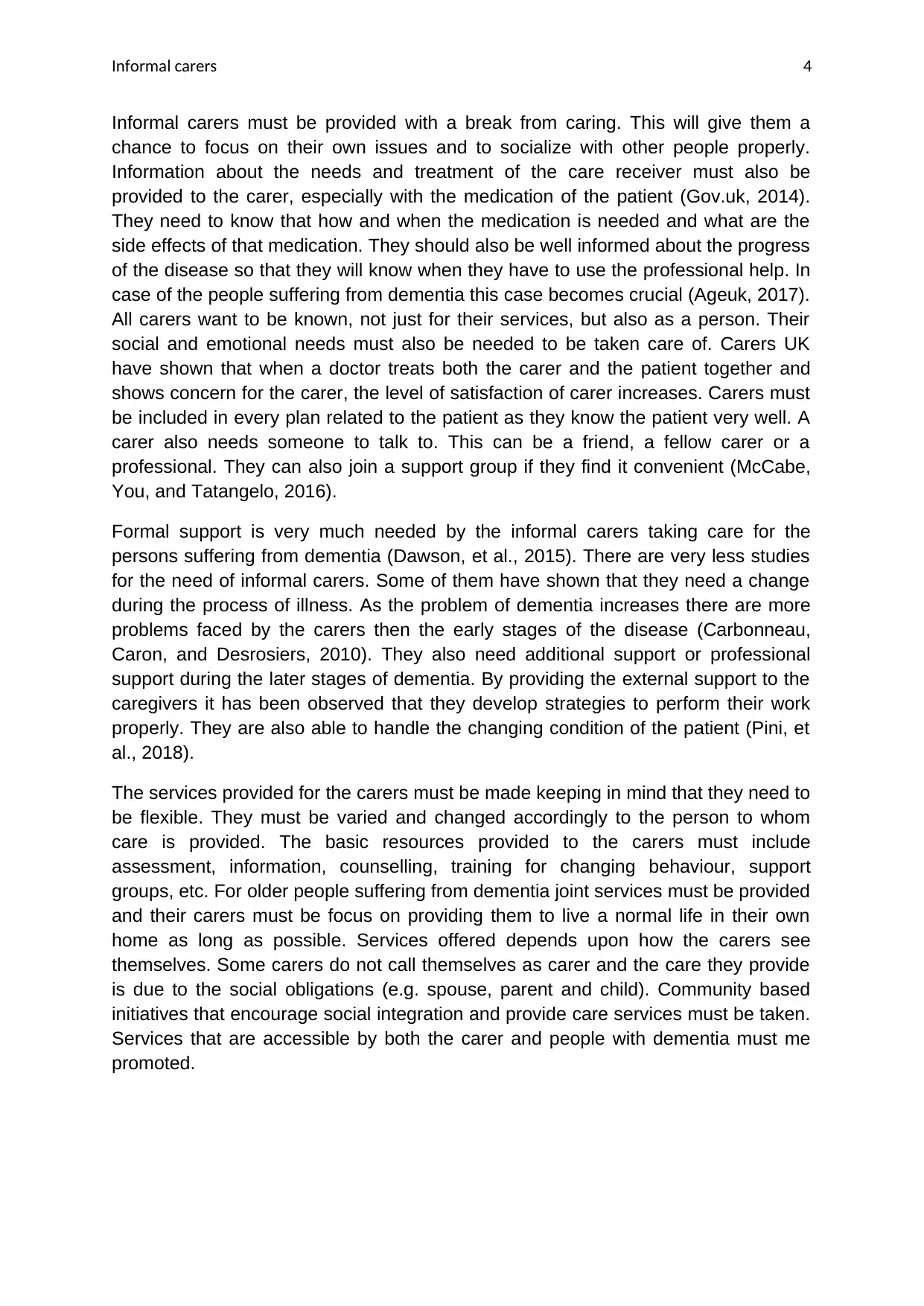
Informal carers 4
Informal carers must be provided with a break from caring. This will give them a
chance to focus on their own issues and to socialize with other people properly.
Information about the needs and treatment of the care receiver must also be
provided to the carer, especially with the medication of the patient (Gov.uk, 2014).
They need to know that how and when the medication is needed and what are the
side effects of that medication. They should also be well informed about the progress
of the disease so that they will know when they have to use the professional help. In
case of the people suffering from dementia this case becomes crucial (Ageuk, 2017).
All carers want to be known, not just for their services, but also as a person. Their
social and emotional needs must also be needed to be taken care of. Carers UK
have shown that when a doctor treats both the carer and the patient together and
shows concern for the carer, the level of satisfaction of carer increases. Carers must
be included in every plan related to the patient as they know the patient very well. A
carer also needs someone to talk to. This can be a friend, a fellow carer or a
professional. They can also join a support group if they find it convenient (McCabe,
You, and Tatangelo, 2016).
Formal support is very much needed by the informal carers taking care for the
persons suffering from dementia (Dawson, et al., 2015). There are very less studies
for the need of informal carers. Some of them have shown that they need a change
during the process of illness. As the problem of dementia increases there are more
problems faced by the carers then the early stages of the disease (Carbonneau,
Caron, and Desrosiers, 2010). They also need additional support or professional
support during the later stages of dementia. By providing the external support to the
caregivers it has been observed that they develop strategies to perform their work
properly. They are also able to handle the changing condition of the patient (Pini, et
al., 2018).
The services provided for the carers must be made keeping in mind that they need to
be flexible. They must be varied and changed accordingly to the person to whom
care is provided. The basic resources provided to the carers must include
assessment, information, counselling, training for changing behaviour, support
groups, etc. For older people suffering from dementia joint services must be provided
and their carers must be focus on providing them to live a normal life in their own
home as long as possible. Services offered depends upon how the carers see
themselves. Some carers do not call themselves as carer and the care they provide
is due to the social obligations (e.g. spouse, parent and child). Community based
initiatives that encourage social integration and provide care services must be taken.
Services that are accessible by both the carer and people with dementia must me
promoted.
Informal carers must be provided with a break from caring. This will give them a
chance to focus on their own issues and to socialize with other people properly.
Information about the needs and treatment of the care receiver must also be
provided to the carer, especially with the medication of the patient (Gov.uk, 2014).
They need to know that how and when the medication is needed and what are the
side effects of that medication. They should also be well informed about the progress
of the disease so that they will know when they have to use the professional help. In
case of the people suffering from dementia this case becomes crucial (Ageuk, 2017).
All carers want to be known, not just for their services, but also as a person. Their
social and emotional needs must also be needed to be taken care of. Carers UK
have shown that when a doctor treats both the carer and the patient together and
shows concern for the carer, the level of satisfaction of carer increases. Carers must
be included in every plan related to the patient as they know the patient very well. A
carer also needs someone to talk to. This can be a friend, a fellow carer or a
professional. They can also join a support group if they find it convenient (McCabe,
You, and Tatangelo, 2016).
Formal support is very much needed by the informal carers taking care for the
persons suffering from dementia (Dawson, et al., 2015). There are very less studies
for the need of informal carers. Some of them have shown that they need a change
during the process of illness. As the problem of dementia increases there are more
problems faced by the carers then the early stages of the disease (Carbonneau,
Caron, and Desrosiers, 2010). They also need additional support or professional
support during the later stages of dementia. By providing the external support to the
caregivers it has been observed that they develop strategies to perform their work
properly. They are also able to handle the changing condition of the patient (Pini, et
al., 2018).
The services provided for the carers must be made keeping in mind that they need to
be flexible. They must be varied and changed accordingly to the person to whom
care is provided. The basic resources provided to the carers must include
assessment, information, counselling, training for changing behaviour, support
groups, etc. For older people suffering from dementia joint services must be provided
and their carers must be focus on providing them to live a normal life in their own
home as long as possible. Services offered depends upon how the carers see
themselves. Some carers do not call themselves as carer and the care they provide
is due to the social obligations (e.g. spouse, parent and child). Community based
initiatives that encourage social integration and provide care services must be taken.
Services that are accessible by both the carer and people with dementia must me
promoted.
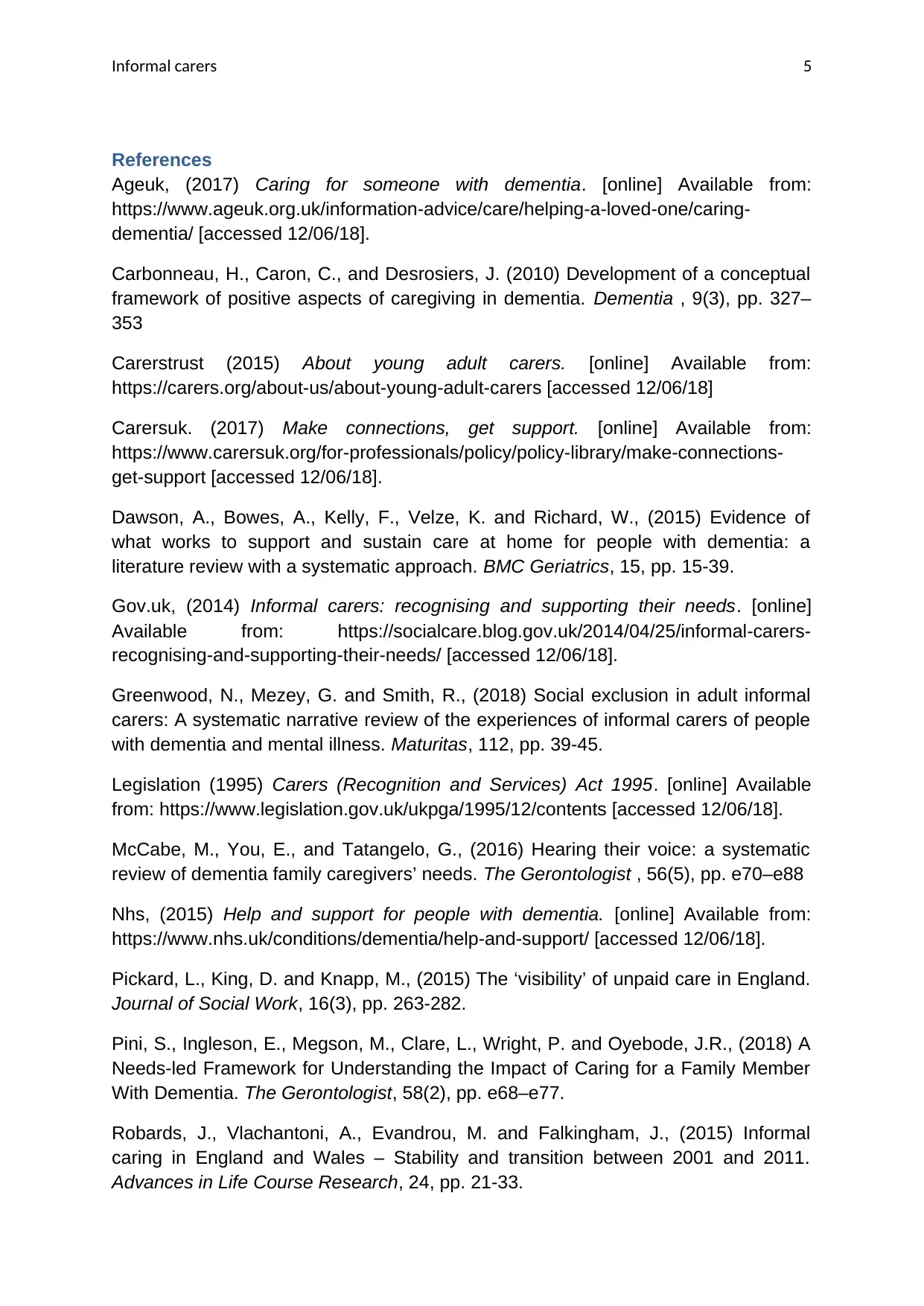
Informal carers 5
References
Ageuk, (2017) Caring for someone with dementia. [online] Available from:
https://www.ageuk.org.uk/information-advice/care/helping-a-loved-one/caring-
dementia/ [accessed 12/06/18].
Carbonneau, H., Caron, C., and Desrosiers, J. (2010) Development of a conceptual
framework of positive aspects of caregiving in dementia. Dementia , 9(3), pp. 327–
353
Carerstrust (2015) About young adult carers. [online] Available from:
https://carers.org/about-us/about-young-adult-carers [accessed 12/06/18]
Carersuk. (2017) Make connections, get support. [online] Available from:
https://www.carersuk.org/for-professionals/policy/policy-library/make-connections-
get-support [accessed 12/06/18].
Dawson, A., Bowes, A., Kelly, F., Velze, K. and Richard, W., (2015) Evidence of
what works to support and sustain care at home for people with dementia: a
literature review with a systematic approach. BMC Geriatrics, 15, pp. 15-39.
Gov.uk, (2014) Informal carers: recognising and supporting their needs. [online]
Available from: https://socialcare.blog.gov.uk/2014/04/25/informal-carers-
recognising-and-supporting-their-needs/ [accessed 12/06/18].
Greenwood, N., Mezey, G. and Smith, R., (2018) Social exclusion in adult informal
carers: A systematic narrative review of the experiences of informal carers of people
with dementia and mental illness. Maturitas, 112, pp. 39-45.
Legislation (1995) Carers (Recognition and Services) Act 1995. [online] Available
from: https://www.legislation.gov.uk/ukpga/1995/12/contents [accessed 12/06/18].
McCabe, M., You, E., and Tatangelo, G., (2016) Hearing their voice: a systematic
review of dementia family caregivers’ needs. The Gerontologist , 56(5), pp. e70–e88
Nhs, (2015) Help and support for people with dementia. [online] Available from:
https://www.nhs.uk/conditions/dementia/help-and-support/ [accessed 12/06/18].
Pickard, L., King, D. and Knapp, M., (2015) The ‘visibility’ of unpaid care in England.
Journal of Social Work, 16(3), pp. 263-282.
Pini, S., Ingleson, E., Megson, M., Clare, L., Wright, P. and Oyebode, J.R., (2018) A
Needs-led Framework for Understanding the Impact of Caring for a Family Member
With Dementia. The Gerontologist, 58(2), pp. e68–e77.
Robards, J., Vlachantoni, A., Evandrou, M. and Falkingham, J., (2015) Informal
caring in England and Wales – Stability and transition between 2001 and 2011.
Advances in Life Course Research, 24, pp. 21-33.
References
Ageuk, (2017) Caring for someone with dementia. [online] Available from:
https://www.ageuk.org.uk/information-advice/care/helping-a-loved-one/caring-
dementia/ [accessed 12/06/18].
Carbonneau, H., Caron, C., and Desrosiers, J. (2010) Development of a conceptual
framework of positive aspects of caregiving in dementia. Dementia , 9(3), pp. 327–
353
Carerstrust (2015) About young adult carers. [online] Available from:
https://carers.org/about-us/about-young-adult-carers [accessed 12/06/18]
Carersuk. (2017) Make connections, get support. [online] Available from:
https://www.carersuk.org/for-professionals/policy/policy-library/make-connections-
get-support [accessed 12/06/18].
Dawson, A., Bowes, A., Kelly, F., Velze, K. and Richard, W., (2015) Evidence of
what works to support and sustain care at home for people with dementia: a
literature review with a systematic approach. BMC Geriatrics, 15, pp. 15-39.
Gov.uk, (2014) Informal carers: recognising and supporting their needs. [online]
Available from: https://socialcare.blog.gov.uk/2014/04/25/informal-carers-
recognising-and-supporting-their-needs/ [accessed 12/06/18].
Greenwood, N., Mezey, G. and Smith, R., (2018) Social exclusion in adult informal
carers: A systematic narrative review of the experiences of informal carers of people
with dementia and mental illness. Maturitas, 112, pp. 39-45.
Legislation (1995) Carers (Recognition and Services) Act 1995. [online] Available
from: https://www.legislation.gov.uk/ukpga/1995/12/contents [accessed 12/06/18].
McCabe, M., You, E., and Tatangelo, G., (2016) Hearing their voice: a systematic
review of dementia family caregivers’ needs. The Gerontologist , 56(5), pp. e70–e88
Nhs, (2015) Help and support for people with dementia. [online] Available from:
https://www.nhs.uk/conditions/dementia/help-and-support/ [accessed 12/06/18].
Pickard, L., King, D. and Knapp, M., (2015) The ‘visibility’ of unpaid care in England.
Journal of Social Work, 16(3), pp. 263-282.
Pini, S., Ingleson, E., Megson, M., Clare, L., Wright, P. and Oyebode, J.R., (2018) A
Needs-led Framework for Understanding the Impact of Caring for a Family Member
With Dementia. The Gerontologist, 58(2), pp. e68–e77.
Robards, J., Vlachantoni, A., Evandrou, M. and Falkingham, J., (2015) Informal
caring in England and Wales – Stability and transition between 2001 and 2011.
Advances in Life Course Research, 24, pp. 21-33.
⊘ This is a preview!⊘
Do you want full access?
Subscribe today to unlock all pages.

Trusted by 1+ million students worldwide

Informal carers 6
Schmitz, H. and Westphal, M., (2017) Informal care and long-term labor market
outcomes. Journal of Health Economics, 56, pp. 1-18.
The Alzheimer’s society, (2018) Support for people with dementia: the care needs
assessment. [online] Available from:
https://www.alzheimers.org.uk/get-support/legal-financial/dementia-care-needs-
assessment [accessed 12/06/18].
The Guardian (2018) Dementia research must study care as well as cure. [online]
Available from:
https://www.theguardian.com/social-care-network/2018/feb/19/dementia-research-
cure-care [accessed 12/06/18].
Schmitz, H. and Westphal, M., (2017) Informal care and long-term labor market
outcomes. Journal of Health Economics, 56, pp. 1-18.
The Alzheimer’s society, (2018) Support for people with dementia: the care needs
assessment. [online] Available from:
https://www.alzheimers.org.uk/get-support/legal-financial/dementia-care-needs-
assessment [accessed 12/06/18].
The Guardian (2018) Dementia research must study care as well as cure. [online]
Available from:
https://www.theguardian.com/social-care-network/2018/feb/19/dementia-research-
cure-care [accessed 12/06/18].
1 out of 7
Related Documents
Your All-in-One AI-Powered Toolkit for Academic Success.
+13062052269
info@desklib.com
Available 24*7 on WhatsApp / Email
![[object Object]](/_next/static/media/star-bottom.7253800d.svg)
Unlock your academic potential
Copyright © 2020–2026 A2Z Services. All Rights Reserved. Developed and managed by ZUCOL.





